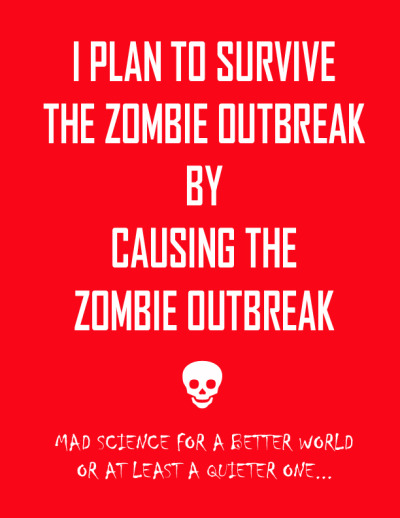 Which should probably alarm me, because one of characters that people best know me for is a mad scientist and self-professed evil genius.
Which should probably alarm me, because one of characters that people best know me for is a mad scientist and self-professed evil genius. Some people have an inner child, I have an inner mad scientist.
For those of you who have read Howard Carter Saves the World, you know Dr Villainous Deeds as Howard's mad science teacher (in every sense). But he's much older than that. Before he became comedy relief for that novel, he was 'tried on' for size in several ways to make sure I could embody that sort of silly/evil character in a believable fashion.
Before I could commit to writing a novel about him, I needed to get inside his scary, freaky, head and see how he ticked.
Under normal circumstances, I 'try on' new characters in a series of short stories or vignettes. Each time the character appears in these short pieces, there are subtle changes as I learn how they move through their worlds and interact with the people they meet. I find my way into their skin and fill it out until they become as real as ink on a page can be. Only then do I commit them to a longer, more complex storyline.
I did this with Howard Carter and his friends, I did this with Ashleigh MacLeod, and I did it with a host of other characters that never grew into actual novels because what the short stories taught me was that I didn't want to live with them through 90,000 words.
Doctor Deeds called for an entirely new approach.
For one thing, Howard Carter Saves the World was going to be written in public. This meant there would be less room for backtracking to excise a problem character. What's more, the sort of slapstick silliness I was going to demand of my mad scientist was of a level that I'd never tried to sustain over that length of narrative.
And thus was the Twitter handle @LaughManiacally born.
Using the 140 character format reinforced the imperative to be fast and funny at the same time. It also gave me the same cushion as short-form fiction. From post to post, I was able to unfold longer stories, develop characters and call back to previous jokes. Deeds had a running series of guest characters, most of them robots. Among the hordes there was the Giant Killer Robot he built out of a garden tractor and a Speak & Spell that would only communicate in blank verse, a rebellious compost heap, hordes of zombie servants, a robotic clothes washer that kept dying his lab coats pink, and a wife who was generally unimpressed by her husband's attempts at world domination.
I wanted people to find his tweets amusing (and over 250 people eventually did) but what I was trying to do was sustain a character who was just pure comic silliness across several months. I sent him to parties at the Dr Jekyll's house (pro tip: don't drink the martinis at the Jekyll's parties), waged war with his off-screen arch-enemy "Pierre". When he forgot their anniversary, his wife teleported him halfway across the country and force him to walk back. (He stole a tractor and turned it into a robot halfway across Kansas, garnering him a surprising number of follows by tractor dealerships.)
All of this was incredibly silly and I admit to getting a bit carried away at one point, but it was anything but pointless. By the time I began writing Howard Carter, I knew all of the characters backward and forward. I knew how they would interact and react, where their moral lines were and what would make them cross them.
Honestly, I knew Deeds better than I've known any character I've ever written. Ironically, he also has less of "Me" in him than any other character I've ever written... or so I like to think.
Anyway, Dr. Deeds lives on, sending out his signal from his hidden base deep underneath a dormant volcano. He has his own Tumblr now and the Twitter account still occasionally awakens to give him a pulpit from which to expound upon the inherent superiority of the robot apocalypse over any piddling zombie thing someone has cooking.
But in case he's wrong... he's got a plan for that one too:


No comments:
Post a Comment
Pages to Type is a blog about books, writing and literary culture (with the occasional digression into coffee and the care and feeding of giant robots).